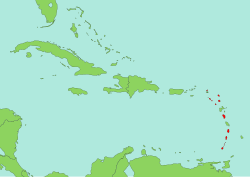East Caribbean dollar
| East Caribbean dollar | |
|---|---|
| East Caribbean dollar (English) | |

Map of countries and territories with the East Caribbean dollar as the official currency.
|
|
| ISO 4217 | |
| Code | XCD |
| Number | 951 |
| Exponent | 2 |
| Denominations | |
| Subunit | |
| 1/100 | cent |
| Symbol | $ |
| Banknotes | 5, 10, 20, 50, 100 dollars |
| Coins | 5, 10, 25 cents, 1 dollar and 2 dollars |
| Demographics | |
| User(s) |
|
| Issuance | |
| Central bank | Eastern Caribbean Central Bank |
| Website | www |
| Valuation | |
| Pegged with | U.S. dollar = XCD 2.70 |
The East Caribbean dollar (symbol: $; code: XCD) is the currency of all seven full members and one associate member of the Organisation of Eastern Caribbean States. It has existed since 1965, being the successor to the British West Indies dollar, and it is normally abbreviated with the dollar sign $ or, alternatively, EC$ to distinguish it from other dollar-denominated currencies. The EC$ is subdivided into 100 cents. It has been pegged to the United States dollar since July 7, 1976, and the exchange rate is US$1 = EC$2.70.
Six of the states using the EC$ are independent states: Antigua and Barbuda, Dominica, Grenada, Saint Kitts and Nevis, Saint Lucia, and Saint Vincent and the Grenadines. The other two are British overseas territories: Anguilla and Montserrat. These states are all members of the Eastern Caribbean Currency Union. The only OECS associate member not using the East Caribbean dollar as their official currency is the British Virgin Islands. The British Virgin Islands were always problematic for currency purposes due to their proximity to the Danish West Indies which became the US Virgin Islands in 1917. Officially, the British Virgin Islands used to use sterling, but in practice the situation was a lot more complicated and involved the circulation of Francs and U.S. dollars. In 1951, the British Virgin Islands adopted the British West Indies dollar which at that time operated in conjunction with the sterling coinage, and in 1961 they changed over officially to the U.S. dollar, no doubt due to the close proximity of the US Virgin Islands.British Guiana and Barbados had previously been members of this currency union but withdrew in 1966 and 1972 respectively. Trinidad and Tobago had been a member of the earlier British West Indies currency union, but withdrew in 1964.
...
Wikipedia
